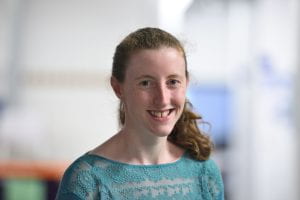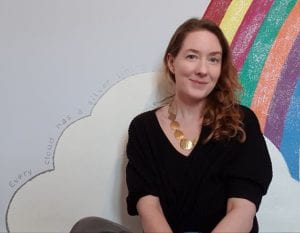Inspired by the Big Issue’s regular feature Letter to My Younger Self, we’re asking staff to think back to their own experiences as a student and tell us what advice they would give to their undergraduate selves.
In this post, we’re delighted to hear from Becky Selwyn, Senior Lecturer in Mechanical Engineering.

What and where did you study?
I studied my MEng in Mechanical Engineering here in Bristol, and as part of the course I spent a year studying in Saint Etienne (in France) for my 3rd year. I stayed here to do my PhD as well, and then realised that lecturing was the thing I wanted to do with my life so I’ve been here ever since!
Did you experience culture shock when you started university?
Yes and no – the studying wasn’t too bad as I had been used to self-motivating and managing my own time from secondary school, and had been working full time during my gap year, but it was overwhelming being surrounded by so many new people all the time. I’m quite introverted, and had only attended relatively small schools, so the step change up to large halls of residence and 100-person lectures was a lot to deal with (I have no idea how UGs cope now that there are sometimes 450 students in a lecture theatre!). Eventually I made some friends to sit with in lectures and to spend time with outside lectures, and that helped me to manage the social overload I felt the rest of the time.
What was your biggest failure and what did you learn from it?
I failed a unit in my final year, and was absolutely devastated. It didn’t stop me graduating, but my initial response was to contact the Unit Director and ask whether I could attempt the resit (obviously without it being recorded on my transcript) – I was desperate to show that I could pass the unit properly, even if it wouldn’t count towards anything. The Unit Director told me to get in touch after the resit period and they would send me a copy of the exam to try. Of course by the time the resit period arrived, my initial feelings about the failure had faded and I didn’t ask for the paper – I was busy enjoying the start of my PhD. It made me realise that initial responses to failure can be very intense, but context, patience, and time make it easier to accept and move on from.
What are you most proud of about your time at university?
In my first year, we had a group design project to make a cup dispensing machine, and my group won the competition. I’d suggested the design for the door, and we were the only group who had that type of mechanism and design, so I like to think that my idea helped us to win, even though our outer casing was held together with tape!
What was the best bit of feedback you received?
I don’t remember receiving any feedback on my work other than a numerical grade and maybe a couple of vague words, but I do remember how I felt after various informal conversations with different members of staff. Some were really positive and left me feeling like I could take on any challenge. Others left me feeling that I didn’t belong here and should give up. I guess the impact of those conversations has influenced how I try to interact with people now – I saw that kindness, reassurance, and support went a long way towards helping me believe I could succeed on my own, so that’s what I try to provide for others. It also made me realise that feedback isn’t just a written comment on a piece of summative work – it’s everything that happens that makes you think about your work, and I try to help students see that too.
What advice would you give to your undergraduate self?
My undergraduate self wouldn’t believe it, but I’d tell myself that I am enough, and should have more confidence to be myself. Everyone is different, and that is where our strengths come from, so stop seeing all the things you aren’t and start embracing all the things you are. Be yourself and do things your way, because it will eventually show others that they can be themselves and succeed on their own terms too.
If you’re a staff member or postgraduate student and would like to write own letter to your undergraduate self, please get in touch: study-skills@bristol.ac.uk


 by Steph Hook, French and Spanish student and Bristol Futures Advocate
by Steph Hook, French and Spanish student and Bristol Futures Advocate by Tala Youhana, Law student and Bristol Futures Advocate
by Tala Youhana, Law student and Bristol Futures Advocate



